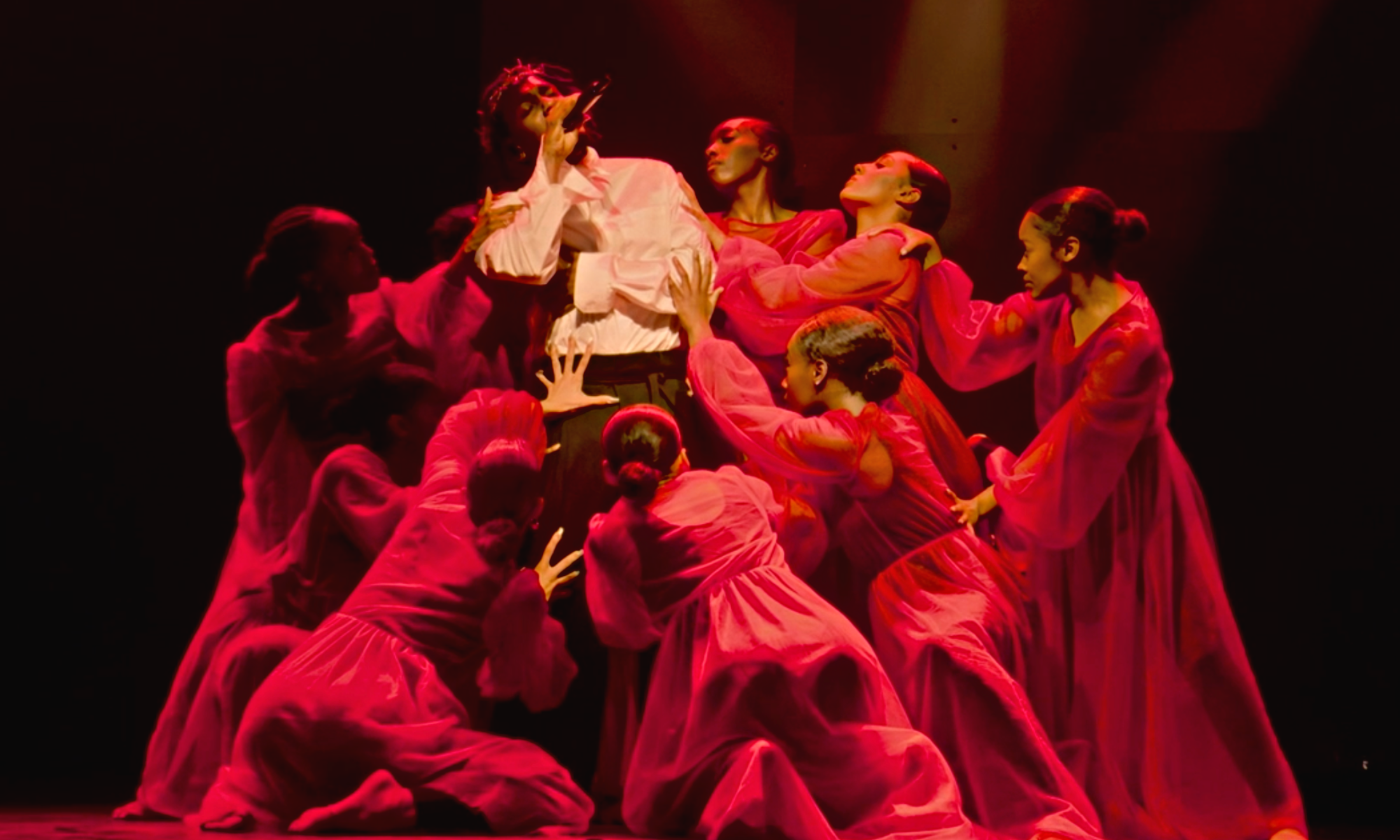Kendrick Lamar: I can judge you because you’re not Christ – you’re a hypocrite on women’s rights
The rapper was on the right side of history at Glastonbury – but I’m left cold by his own past.
Jumi Akinfenwa
30 Jun 2022

BBC
Content warning: This article contains mention of sexual assault, homophobia and transphobia.
“They judge you, they judge Christ / Godspeed for women’s rights,” Kendrick Lamar chants, almost exasperated. He has just concluded his headlining set at Glastonbury 2022, closing out the 50th edition of the iconic festival. This repeated mantra is a direct reference to the US Supreme Court’s reversal of Roe v. Wade a few days prior, a decision which now places uterine reproductive rights in the hands of individual states as opposed to granting pregnant people the right to choose. It is an undeniably powerful plea, especially coming from a Black cis-het male rapper. Being one of few men to address this onstage, not only for the 200,000 festival goers but also to those watching at home, it suggests that he is an ally. This moment was lauded by the likes of The Guardian, The Independent and GQ, to name a few, and on the surface, they are right to praise it.
Unfortunately, what has hardly been acknowledged by media outlets is the wider context of this statement with regard to Lamar’s recent album Mr Morale & The Big Steppers, which features rapper Kodak Black, who pled guilty to assault and battery in 2021 in relation to the sexual assault of a teenage girl in 2016, for which he accepted a plea deal and served 18 months probation. Kendrick is yet to comment on this. Whilst Kendrick is not duty bound to even acknowledge it, nor do I have any expectation that he will, given that he “ain’t taking shit back”, it makes his alleged support for women’s rights feel somewhat meaningless, and almost crass. Yet he does not deem himself to be a perfect person, nor a Christlike figure, despite what his bespoke Tiffany & Co crown of thorns encrusted in 8,000 diamonds might lead you to believe. And while he is learning and growing, this doesn’t mean he can be absolved of any criticism. If Kendrick is so adamant in his desire to not be viewed as a mouthpiece for the culture, why bother to make such a statement? For many survivors of sexual violence, knowing who can offer genuine support is paramount for recovery. Even if he is not a “saviour”, by uttering such a bold statement, Kendrick is suggesting that his spaces are safe, yet how safe are they really?
As Philly Mag’s Ernest Owens highlighted in May 2022, Kendrick’s inclusion of Kodak Black in the project is purposeful in its attempt to rehabilitate him. Whilst it would be short sighted to suggest that Kodak Black is beyond saving or forgiveness, it is not for Kendrick to govern this redemption arc, but rather the victim and those whose freedoms are being infringed upon. Moreover, in 2018, the CEO of his label, Top Dawg Entertainment, threatened to remove Lamar’s catalogue from Spotify on the basis that music by R Kelly and XXXTentation, both also accused of violence against young women, should not be removed from the platform, as he didn’t deem it right for artists to be censored “especially in our culture”, a threat that Kendrick did not speak out against. Pointing out in ‘We Cry Together’, that “we all know you still playin’ his music”, in reference to R Kelly, whilst true for a misguided, yet vocal, minority, this suggests that Kendrick does not think we can pass judgement on one another based on our personal choices. Based on his own argument, we should also be able to judge him on his own hypocrisy.
“It’s all in the name of art and shock value and for Kendrick: the “flawed” Black men play a central role within his narrative, with women victims left to fend for themselves with scraps in the form of milquetoast statements”
Furthermore, his video for recent track ‘The Heart Part 5’ included a deepfake of OJ Simpson, who has a storied history in regards to alleged violence against women, alongside other cause célèbres, including Jussie Smollett and Kanye West. It’s all in the name of art and shock value and for Kendrick: the “flawed” Black men play a central role within his narrative, with women victims left to fend for themselves with scraps in the form of milquetoast statements.
Given all of this context, the Glastonbury moment seems contradictory and even performative, further suggesting that it was an empty platitude. It’s one thing to express your support for women, which Kendrick has done. But if you are continuing to uphold cycles of abuse in the name of Black culture and protect and prioritise the careers of those who have violated the bodily autonomy of the marginalised people you are also claiming to support, then these words fall on deaf ears.
Some have called Kendrick out for blasphemy and insensitivity in the invoking of religious imagery, with Christianity being influential in the Supreme Court decision. Whilst there is some truth to this, I’d argue Lamar is instead framing himself as the legitimate voice of reason due to his own admitted vulnerability. Yet this is done in the name of storytelling and personal growth, arguably why some have given the homophobic and transphobic slur-laden “Auntie Diaries” a pass because he “didn’t know any better”. Some have suggested that we should be satisfied that he’s even daring to discuss such issues in the first place. But starting the conversation is the easy part. Actually giving space to those who are directly impacted to exercise their freedom and own growth is another. In ‘Worldwide Steppers’, Kendrick raps about sleeping with white women as revenge for slavery (“ancestors watchin’ me f*ck was like retaliation”), another example in which a woman’s body is simply used as a means to an end, to aid his own emotional processing.
“If Kendrick is no better than us, then he deserves to be analysed”
Speaking during his Glastonbury performance, Kendrick explains his crown was worn as a representation so the audience would “never forget one of the greatest prophets who walked the Earth…they judge you, they judge Christ”. That is to say that Kendrick does not wish to be deified, despite his Christlike persona, it is purposefully ironic. This is all well and good but the irony is lost when you consider how hard it is to genuinely critique Kendrick as some fans put him on a pedestal for his ‘conscious’ rap. If Kendrick is no better than us, then he deserves to be analysed.
Kendrick Lamar has long been framed as the ‘conscious’ rapper. The free thinker. The artiste. The archetypal male genius. The one that anyone who dares to criticise simply “doesn’t get”. The majority of those pointing out the hypocrisy in Kendrick’s support of women’s rights and the perceived posturing are Black women on Twitter, as opposed to music journalists who reviewed the set. Whilst one could argue that critics should be focused on the music and performance itself, which is worth noting, are actually excellent sonically and visually, it’s personally hard to ignore the wider context, especially when marginalised groups are being harmed by it. Whilst music journalists do not speak for the masses, it is disappointing to not have them reflect the broad scope of public opinion, with Black women in particular often left out of the narrative or being considered to be a fringe group.
“You’re still allowed to be a fan of Kendrick Lamar… but you cannot claim that he is a poster boy for women’s rights in any meaningful way”
Kendrick wasn’t necessarily calculated in a malicious way in using Glastonbury as his stage to invoke this message, but there is the known likelihood of the main demographic of the festival, being largely middle class and white, to accept said message at face value. This audience was likely unaware of the information about the support of those who have committed sexual violence against women. Or those who are aware simply don’t care. Arguably, they came to see a show and be entertained, not conduct critical analysis, thus placing even more importance on music journalists to raise these points. With this knowledge, you’re still allowed to be a fan of Kendrick Lamar. You can still say that he put on a great show and that his messaging was important and powerful. But you cannot claim that he is a poster boy for women’s rights in any meaningful way.
The age-old idiom of “actions speak louder than words” really comes into play here. The use of “godspeed”, which by definition implies that Lamar will not be coming along on this journey towards greater rights for those of marginalised genders but instead will wish us luck on our merry way, gives credence to the impression that “women’s rights” are not his priority. For Lamar’s words to really hold power beyond stirring up emotion, they need to be followed with action. You don’t need to be a “saviour” to dismantle the patriarchy. If anything, it’s a distinctly human act.
Like what you’re reading? Our groundbreaking journalism relies on the crucial support of a community of gal-dem members. We would not be able to continue to hold truth to power in this industry without them, and you can support us from £5 per month – less than a weekly coffee.
Our members get exclusive access to events, discounts from independent brands, newsletters from our editors, quarterly gifts, print magazines, and so much more!

Britain’s policing was built on racism. Abolition is unavoidable

How Pakistan’s Khwaja Sira and transgender communities are fearing and fighting for their futures

Their anti-rape performance went viral globally. Now what?






